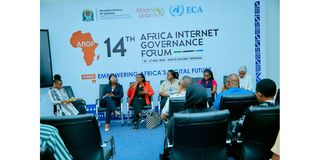Prime
Tanzania prepares for national roaming to boost digital connectivity

What you need to know:
- Under the unified network model, mobile users will be able to connect to any available network regardless of their original service provider.
Dar es Salaam. Tanzania is in the process of preparing a framework and legislation to implement a unified mobile network system—referred to as National Roaming—aimed at promoting seamless digital communication both locally and across Africa.
The development aligns with a broader continental resolution by African ministers responsible for information, communication, and digital technology to establish a single mobile network to boost the continent’s digital economy.
Under the unified network model, mobile users will be able to connect to any available network regardless of their original service provider.
For instance, a Tanzanian using a Yas SIM card will still receive network coverage in areas with Airtel, Vodacom, or Halotel towers.
Furthermore, the same SIM card will function in other African countries, removing the need to buy new SIM cards when travelling.
Speaking at the closing ceremony of the 14th African Internet Governance Forum (AfIGF), the Permanent Secretary in the Ministry of Information, Communication and Information Technology, Mohammed Khamis Abdulla, said Tanzania has already started working towards this.
“We are currently reviewing how best to include national roaming in our guidelines or legislation. In Tanzania, we’ve managed to expand network coverage across the country, but we still face challenges. You might visit a village where only a Yas tower is available, and if you’re using Vodacom, you’d claim there’s no signal—yet the area does have coverage,” he explained.
“With national roaming, any tower—be it Vodacom, Yas, Halotel or Airtel—would support all networks. This system has already started functioning within East Africa. If you’re in Uganda using Airtel, the same SIM works in Kenya due to the existing communication integration,” Abdulla added.
He emphasised that although Africa is currently divided into regions—South, East, West and North—most zones have already begun integration.
“The next step is to unify fully, such that if you travel from Tanzania to South Africa, you continue using your original SIM. A large portion of this is already happening,” he noted.
Chairperson of Tanzania’s Internet Governance Forum, Dr Nazar Kilama, also stressed the importance of such integration for Africa’s digital economy.
He gave an example where a Tanzanian travelling to Benin should be able to use the same SIM card without buying a new one or exchanging money just to purchase a local SIM.
“With a single network, even if you’re conducting business in Benin, you won’t need to switch SIM cards or currency. You should just be able to load airtime or data using your Visa or debit card and continue with your activities uninterrupted,” Dr Kilama stated.
He added that such resolutions could enhance both Africa’s overall economy and individual economic growth.
Participants at the forum unanimously affirmed their commitment to the African Union’s founding charter and the goals outlined in Agenda 2063.
They issued a joint statement recognising the importance of the African Digital Compact (ADC) and its alignment with the Global Digital Compact (GDC), aimed at building a digitally empowered Africa where technology drives economic growth, social well-being, and shared prosperity.
The forum participants pledged to advance Africa’s digital future through democratic, inclusive, and rights-based internet governance.
They committed to developing a robust action plan addressing key challenges while unlocking opportunities for sustainable digital development.
They also acknowledged the successes achieved through the World Summit on the Information Society (WSIS) process but highlighted ongoing barriers preventing Africa’s full participation in the global digital economy.
The forum created a platform for joint collaboration in shaping digital policies and frameworks that serve the continent’s collective interests and promote inclusive internet services.
Experts discussed topics such as Artificial Intelligence (AI) and emerging technologies, public digital infrastructure, and data governance. Key challenges identified included inadequate infrastructure and poor connectivity.
A large portion of Africa’s population remains disconnected due to limited broadband access, high data costs, and a lack of efficient communication pathways.
Moreover, the participants noted problems with internet resource management, particularly at the African Network Information Centre (AFRINIC), which faces significant operational and governance issues.
These include financial instability, leadership disputes, and legal uncertainties—factors threatening the effective administration of internet resources.
Other concerns raised included the lack of digital knowledge in educational systems, especially on advanced technologies like AI, big data, and cybersecurity.
Most school curricula still do not incorporate ICT education at the foundational level, denying children early exposure to digital skills.
Weak data protection systems and limited cybersecurity capabilities also leave countries vulnerable to cybercrime, privacy violations, and attacks on critical infrastructure.
Additionally, participants pointed out the lack of digital content in native African languages and culturally relevant contexts.
This gap hinders digital inclusion and the preservation of cultural heritage.
The forum resolved to create a continent-wide system for monitoring and evaluating digital progress, with biennial reports to the Africa IGF to ensure transparency and evidence-based decision-making.
They also pledged to close the gender gap in technology usage, promote female leadership in internet governance, and empower African youth to participate in the creation of digital policies and solutions.






